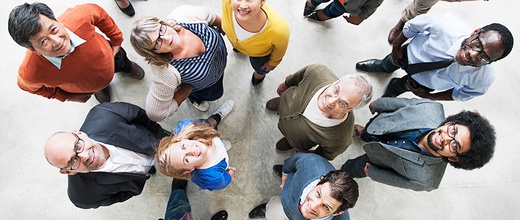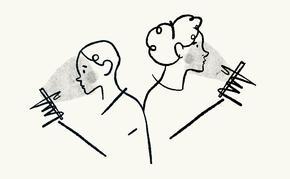The views expressed in our content reflect individual perspectives and do not represent the authoritative views of the Baha'i Faith.
When I ask my college students if they believe that world peace is possible, they look at me as if I am naïve and idealistic.
It will never happen, they say. Jaded and part of a generation that has seen much conflict with seemingly no resolution in sight, they usually reflect the truth they know.
Yet, I tell them, “Look for signs of progress. Surely as a human species we are maturing and will grow through this stormy adolescence into a collective adulthood, where consultation and respect will replace physical warfare.”
They are still dubious. I give them examples of individual actions and groups that work to bridge the gaps between races, religions, ethnicities; they come back with examples of recent atrocities.
I often share one story of a woman whose photograph was on the cover of Time magazine in the 60s during the struggle of the integration of Little Rock’s Central High School. The white woman held a rock in her hand to throw at one of the nine African-American students simply attempting to walk to school. Forty years later, when the Central High museum was dedicated, this woman publically apologized to the younger woman she almost hit. They embraced.
“But it took 40 years,” my students respond. Yes, but it happened. Look for signs of progress, I suggest. They shrug—whatever.
I was heartened when I received a message at the end of the semester from a quiet student who sat in the back of a large class. She wrote:
This world lit. class completely changed my life. It has freed my mind from racial constraints and helped me develop a huge respect for people from other countries. Not to say I was racist, I was just uninterested.
I now love reading stories and watching films from other cultures and learning about things I could never even imagine. I used to be afraid to talk to people of other races, but now I find myself befriending people from around the world. I can finally see outside my ‘bubble’ and hope that many other people in the world develop a love for all cultures. We are all humans, anyway.
After weeping for several minutes when I received this message, I responded: “Bravo! This life-changing awareness will serve you well in the years ahead. It can also be contagious. This is what will solve terrorism and bring about world peace.”
A few years later I heard from the student again—she had pursued a graduate degree in anthropology and had lived and worked in both Thailand and Italy. Again, she told me that the class had changed her entire world view.
Committed to the stance of promoting peace and international awareness, I realize that as an educator one of the best things I can impart is simply a sense of hope about the world these young people will inherit. So I continue to look for—and find and pass on—signs of progress.
My “idealism” is not based on a vague and simplistic hope, but rather on the profound teachings of the Baha’i Faith. World peace is not only possible but inevitable, the Baha’i teachings assert. Baha’is believe that the impediments to peace—prejudice, lack of equality, unbridled nationalism, poverty—will all diminish as the teachings of the Faith continue to transform the planet:
The Great Peace towards which people of good will throughout the centuries have inclined their hearts, of which seers and poets for countless generations have expressed their vision, and for which from age to age the sacred scriptures of mankind have constantly held the promise, is now at long last within the reach of the nations. For the first time in history it is possible for everyone to view the entire planet, with all its myriad diversified peoples, in one perspective. World peace is not only possible but inevitable. It is the next stage in the evolution of this planet — in the words of one great thinker, “the planetization of mankind”. – The Universal House of Justice, October 1985, The Promise of World Peace, p. 1.
What will be the largest contribution to world peace? Women! Women, educated to understand our strength. Women, refusing to allow their men to go to war—or go to war themselves. Women, putting into practice the skills of consultation, nurturance, peace-building, international arbitration, compassion:
Another fact of equal importance in bringing about international peace is woman’s suffrage. That is to say, when perfect equality shall be established between men and women, peace may be realized for the simple reason that womankind in general will never favor warfare. Women will not be willing to allow those whom they have so tenderly cared for to go to the battlefield. When they shall have a vote, they will oppose any cause of warfare. – Abdu’l-Baha, The Promulgation of Universal Peace, p. 167.
The Baha’i teachings say that putting our energies into the current political system cannot bring forth real answers. Instead, we need to create a new system, based on a new blueprint of human awareness. This change will not come only from marches or protests, but another kind of individual activism. We need to make the process of peacemaking rival the dynamic of war-mongering.
Abdu’l-Baha, along with the Bab and Baha’u’llah, gave the world prayers that can help us focus on creating a positive and united planet, such as the following excerpt:
O Thou the Compassionate God. Bestow upon me a heart which, like unto a glass, may be illumined with the light of Thy love, and confer upon me thoughts which may change this world into a rose garden through the outpourings of heavenly grace. – Abdu’l-Baha, Baha’i Prayers, p. 71.
We can all look for hopeful signs of this peaceful, spiritual “rose garden” blooming, and strive that our lives will have a unifying influence on the world.

















Comments
Sign in or create an account
Continue with Facebookor